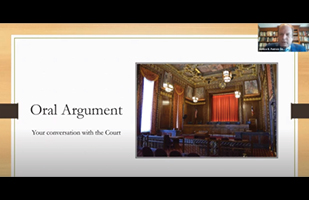Appeal-ing Arguments: Justice Offers Keys for Supreme Court Cases

Justice R. Patrick DeWine is connecting with Ohio's bar associations to better prepare attorneys about appealing cases to the Ohio Supreme Court./p>

Justice R. Patrick DeWine is connecting with Ohio's bar associations to better prepare attorneys about appealing cases to the Ohio Supreme Court.
Appellate lawyers throughout the legal profession learn from one another about how to present a case to the Ohio Supreme Court. While that’s helpful, one justice decided to add more direct insight.
Justice R. Patrick DeWine has been instructing a continuing legal education course (CLE) for local bar associations titled, “Effective Ohio Supreme Court Advocacy.” It details the specifics of the Supreme Court’s appellate process and provides practical suggestions for advocates.
“We know this is a topic of great interest for Ohio litigators, and we’ve come to appreciate the justice for his skilled writing and thoughtful opinions,” said Ryan Winkler, an attorney and chair of the litigation section of the Cleveland Metropolitan Bar Association.
When the pandemic began last year, and local bar associations modified their continuing legal education courses to videoconferencing formats, Justice DeWine thought “it would be worthwhile” to develop an informational session to “share best practices for advocacy in the Ohio Supreme Court.”
“Both the Court and litigants benefit when attorneys effectively convey their arguments to the Court,” Justice DeWine said.
The tutorial is broken down into the stages of each appeal:
- Supporting and opposing jurisdiction – The most effective arguments to convince the Court to accept a case, and arguments that counter the claims.
- Court’s review – Insight into the justices’ process on deciding whether to accept a case.
- Briefing – Tips about legal writing and preparing the most persuasive written arguments.
- Oral arguments – How to effectively argue before the Court and answer the justices’ questions.
- Decision – An inside look at the Court’s deliberative process, opinion writing, and ruling on the case.
“Too often, advocates devote the majority of their argument to explaining why the court below erred,” Justice DeWine said.
“However, the Supreme Court doesn’t view its role as primarily one of error correction, so litigants are far better served by focusing on why acceptance of the case will impact the legal system beyond the immediate interests of the parties.”
When it comes to brief writing, Justice DeWine urged advocates to follow the rule that a good brief should be written at a level of clarity that it can be read over “one sitting and two martinis.”
Justice DeWine provided helpful tips for brief writing, including detailing background facts, limiting the use of block quotes and boilerplate language, eliminating confusing acronyms, and using visual aids.
He stressed the importance of vigorous editing, clarifying that writing with unnecessary or repetitive elements causes the reader to lose the focus of the argument.
“A shorter, more tightly edited brief is almost always better than a longer, wandering brief,” Justice DeWine added.
For oral arguments, Justice DeWine underscored that lawyers are best served by treating the argument as a conversation with a court.
“The attorney who comes to oral argument intimately familiar with the facts and law and prepared to engage with the justices’ questions, invariably does better than the attorney who is wedded to a prepared script,” explained Justice DeWine.
Lessons about the specifics and precision with written and verbal arguments extend beyond Supreme Court appeals, which is valuable to all practitioners. Among the hundreds of thousands filed within Ohio’s court system annually, roughly 100 make it to the state’s high court.
“Justice DeWine related his experience and the practices of the Supreme Court in a way that applies to all our local bar members in their practice,” said Ashtabula County Common Pleas Judge Michelle Fisher.
With the uncertainty about when oral arguments will return in person, there was also a portion dedicated to issues unique to remote hearings, including how to minimize visual or audio distractions and avoid technical problems.
Thus far, Justice DeWine has presented the course to bar associations in Cleveland, Columbus, Dayton, Toledo, Akron, and Warren and Ashtabula counties.
Other legal groups interested in Justice DeWine’s presentation may contact his office.


